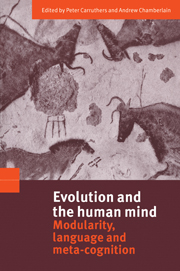Book contents
- Frontmatter
- Contents
- List of contributors
- Preface
- 1 Introduction
- 2 Massively modular minds: evolutionary psychology and cognitive architecture
- 3 Individual differences in early understanding of mind: genes, non-shared environment and modularity
- 4 Darwin in the madhouse: evolutionary psychology and the classification of mental disorders
- 5 Evolution of the modern mind and the origins of culture: religious concepts as a limiting-case
- 6 Symmetry and the evolution of the modular linguistic mind
- 7 Evolution, communication and the proper function of language
- 8 The evolution of knowledge
- 9 Mind, brain and material culture: an archaeological perspective
- 10 The evolution of strategic thinking
- 11 On the origin of the human mind
- 12 The evolution of consciousness
- 13 Evolution, consciousness and the internality of the mind
- References
- Author index
- Subject index
12 - The evolution of consciousness
Published online by Cambridge University Press: 18 December 2009
- Frontmatter
- Contents
- List of contributors
- Preface
- 1 Introduction
- 2 Massively modular minds: evolutionary psychology and cognitive architecture
- 3 Individual differences in early understanding of mind: genes, non-shared environment and modularity
- 4 Darwin in the madhouse: evolutionary psychology and the classification of mental disorders
- 5 Evolution of the modern mind and the origins of culture: religious concepts as a limiting-case
- 6 Symmetry and the evolution of the modular linguistic mind
- 7 Evolution, communication and the proper function of language
- 8 The evolution of knowledge
- 9 Mind, brain and material culture: an archaeological perspective
- 10 The evolution of strategic thinking
- 11 On the origin of the human mind
- 12 The evolution of consciousness
- 13 Evolution, consciousness and the internality of the mind
- References
- Author index
- Subject index
Summary
How might consciousness have evolved? Unfortunately for the prospects of providing a convincing answer to this question, there is no agreed account of what consciousness is. So any attempt at an answer will have to fragment along a number of different lines of enquiry. More fortunately, perhaps, there is general agreement that a number of distinct notions of consciousness need to be distinguished from one another; and there is also broad agreement as to which of these is particularly problematic – namely phenomenal consciousness, or the kind of conscious mental state which it is like something to have, which has a distinctive subjective feel or phenomenology (henceforward referred to as p-consciousness). I shall survey the prospects for an evolutionary explanation of p-consciousness, on a variety of competing accounts of its nature. My goal is to use evolutionary considerations to adjudicate between some of those accounts.
Drawing distinctions
One of the real advances made in recent years has been in distinguishing different notions of consciousness (see particularly: Rosenthal, 1986; Dretske, 1993; Block, 1995; Lycan, 1996). Not everyone agrees on quite which distinctions need to be drawn; but all are at least agreed that we should distinguish creature consciousness from mental-state consciousness. It is one thing to say of an individual person or organism that it is conscious (either in general or of something in particular); it is quite another thing to say of one of the mental states of a creature that it is conscious.
- Type
- Chapter
- Information
- Evolution and the Human MindModularity, Language and Meta-Cognition, pp. 254 - 275Publisher: Cambridge University PressPrint publication year: 2000
- 4
- Cited by

